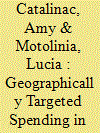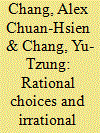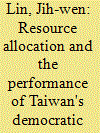| Srl | Item |
| 1 |
ID:
181198


|
|
|
|
|
| Summary/Abstract |
Can governments elected under mixed-member majoritarian (MMM) electoral systems use geographically targeted spending to increase their chances of staying in office, and if so, how? Although twenty-eight countries use MMM electoral systems, scant research has addressed this question. The authors explain how MMM’s combination of electoral systems in two unlinked tiers creates a distinct strategic environment in which a large party and a small party can trade votes in one tier for votes in the other tier in a way that increases the number of seats won by both. They then explain how governing parties dependent on vote trading can use geographically targeted spending to cement it. These propositions are tested using original data from Japan (2003–2013) and Mexico (2012–2016). In both cases, municipalities in which the supporters of governing parties split their ballots as instructed were found to have received more money after elections. The findings have broad implications for research on MMM electoral systems, distributive politics, and the politics of Japan and Mexico.
|
|
|
|
|
|
|
|
|
|
|
|
|
|
|
|
| 2 |
ID:
092511


|
|
|
| 3 |
ID:
132776


|
|
|
|
|
| Publication |
2014.
|
| Summary/Abstract |
Politics always involves the exchange of resources for votes, but the mechanism differs according to the electoral institution. The principal-agent model identifies two necessary conditions for this exchange to be feasible: (1) the opportunity cost of preferential grants is small, and (2) agents receiving these resources play a vital role in helping the principal to win. These conditions were satisfied in the presidential election of 2004, when swing voters were critical in helping the Democratic Progressive Party (DPP) to retain the presidency and limited costs were attached to the resources demanded by legislators elected under the single non-transferable vole (SNTV) system. After 2004, the president no longer exchanged grants for votes at the national level because swing voters could hardly change the result of presidential elections while the opportunity cost of grants was raised by the plurality-tier of the mixed-member majoritarian (MMM) system. Nevertheless, resource allocation still dominates local politics. After MMM was introduced, DPP legislators elected in DPP-led regions distributed the resources that were helpful to consolidating potential supporters; those campaigning in KMT-administered areas, however, attempted to lure swing voters by providing them with extra services-just like what their local heads did.
|
|
|
|
|
|
|
|
|
|
|
|
|
|
|
|